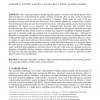Free Online Productivity Tools
i2Speak
i2Symbol
i2OCR
iTex2Img
iWeb2Print
iWeb2Shot
i2Type
iPdf2Split
iPdf2Merge
i2Bopomofo
i2Arabic
i2Style
i2Image
i2PDF
iLatex2Rtf
Sci2ools
GPEM
2007
2007
Genomic mining for complex disease traits with "random chemistry"
Our rapidly growing knowledge regarding genetic variation in the human genome offers great potential for understanding the genetic etiology of disease. This, in turn, could revolutionize detection, treatment, and in some cases prevention of disease. While genes for most of the rare monogenic diseases have already been discovered, most common diseases are complex traits, resulting from multiple gene-gene and gene-environment interactions. Detecting epistatic genetic interactions that predispose for disease is an important, but computationally daunting, task currently facing bioinformaticists. Here, we propose a new evolutionary approach that attempts to hill-climb from large sets of candidate epistatic genetic features to smaller sets, inspired by Kauffman’s “random chemistry” approach to detecting small auto-catalytic sets of molecules from within large sets. Although the algorithm is conceptually straightforward, its success hinges upon the creation of a fitness function able to...
| Added | 14 Dec 2010 |
| Updated | 14 Dec 2010 |
| Type | Journal |
| Year | 2007 |
| Where | GPEM |
| Authors | Margaret J. Eppstein, Joshua L. Payne, Bill C. White, Jason H. Moore |
Comments (0)

